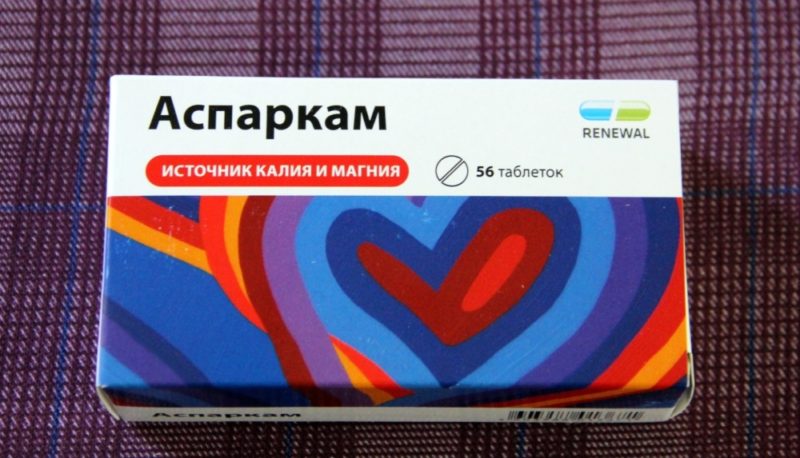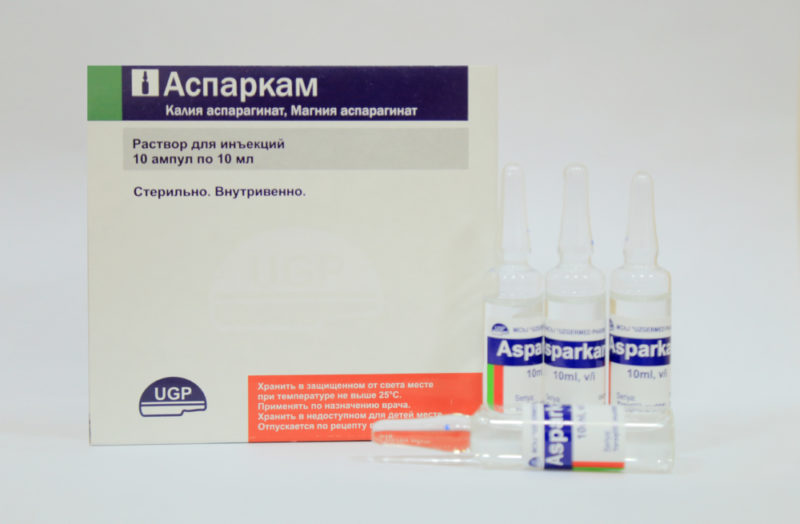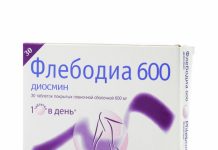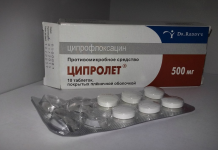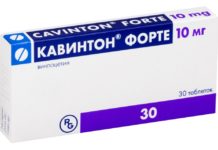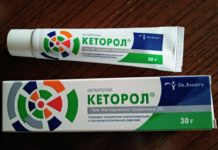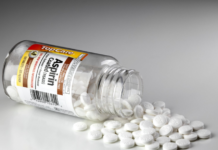Why apply Asparkam every specialist knows. The composition of this medication includes potassium and magnesium in an easily digestible form, which allows you to quickly restore the deficiency of these components in the body. The medication in question contributes to the normalization of the electrolyte balance when it is disturbed.
Material Content:
The composition of the drug
The instruction for use states that the following components are included in the composition of the tablets:
- potassium aspartate;
- magnesium aspartate;
- calcium stearate;
- starch;
- talc.
The drug includes an equal volume of active components, 175 mg each.
Injections Asparkam in 1 ml of solution contains 45 mg of potassium, 40 mg of magnesium, sorbitol, D-aspartic acid, burnt magnesia, potassium hydroxide and liquid for intravenous injection. The product is transparent with a yellowish tint.
Pharmacological action and pharmacokinetics
Asparkam (tablets and injections) promotes the supply of potassium and magnesium ions to the body, normalizes the metabolism in the myocardium, enhances the action of herbal preparations aimed at restoring the normal functioning of the heart, and helps to ensure optimal heart rhythm.
Taking the medication allows you to prevent and eliminate hypokalemia, facilitates the spread of minerals in the inner space of cells.
The maximum amount of potassium and magnesium ions in the body is observed after 2 hours. Excretion is carried out by the urinary system.
What is Asparkam used for?
Asparkam is prescribed by specialists for the treatment of various pathological conditions associated with impaired electrolyte balance and the level of magnesium and potassium in the body.
Indications for use of Asparkam:
- pathological manifestations caused by hypokalemia and excess magnesium in the body;
- heart rhythm disturbance provoked by an insufficient amount of potassium and magnesium;
- cardiac pathologies associated with poisoning or intolerance to plants of the Digitalis genus;
- paroxysmal atrial fibrillation;
- ventricular extrasystole;
- disruption of the heart muscle associated with its weakening;
- expansion of coronary vessels;
- disruptions in metabolic processes in the myocardium;
- preventive measures of coronary heart disease, angina pectoris, heart failure and heart attack.
In combination with Furosemide, potassium and magnesium preparations are prescribed to eliminate swelling of the internal organs. The combination of the presented means allows you to reduce the load on the heart muscle, normalize venous blood flow and eliminate excess body weight caused by the accumulation of excess moisture in the body.
Instructions for use and dosage
The dosage of the drug directly depends on the complexity of the course of the disease, the individual characteristics of the human body and the dosage form of the drug.
The solution for injection and infusion is administered intravenously under the supervision of a specialist. An intravenous product containing potassium asparaginate and magnesium is recommended for use 2 times in 24 hours. Before administration, the drug is diluted with 0.9% sodium chloride. The treatment course is 5-7 days.
An infusion medication is injected into a vein through a dropper with an intensity of 20-30 drops in one minute. With a faster process, reddening of the skin may occur. In the treatment of diseases of the cardiovascular system, the use of 300 ml of the solution daily is indicated. The duration of the course should not exceed 5 days.
Tablets containing magnesium asparaginate and potassium are intended for oral use. The medicine should be swallowed in its entirety and washed down with a small volume of liquid.
For therapeutic purposes, the medication is indicated to take 2 tablets 3 times in 24 hours. The duration of therapy is 21–28 days. To consolidate the result, the doctor can prescribe a second course of treatment after 2-3 months.
Prophylactic administration of the drug is carried out during the month for 1 tablet 3 times in 24 hours after eating food. The need for such prevention should be agreed with a specialist.
Children "Asparkam" is prescribed for deficiency of potassium ions in the blood or with severe hypokalemia. Tablets are prescribed only after laboratory analysis and pathology. Intravenous administration of the drug is performed with a clear threat to life.
With heart pathologies or a lack of potassium in the body, the following dosages of the drug are prescribed relative to the age of the child:
- up to 12 months - ¼ tablets once a day;
- 12–36 months - ½ tablets once every 24 hours;
- 3–6 years - ½ tablets 2 times a day;
- 7-10 years - ½ tablets 3 times a day;
- 11-16 years old - 1 tablet 2 times a day;
- from 16 years - 1 tablet 3 times in 24 hours.
Self-treatment of children with Asparkam can lead to pathological consequences, side effects and serious health problems of the patient.
Experts recommend using Asparkam in combination with vitamin B6 or products containing it, since without this element magnesium is not absorbed by the body.
During pregnancy and lactation
During pregnancy, the medication is used as part of complex measures to eliminate and prevent the following pathologies:
- preeclampsia;
- spontaneous abortion;
- swelling of the extremities, causing discomfort during movement;
- pathology of the cardiovascular system;
- increased tone of the uterus;
- violation of normal bowel movements.
During breastfeeding, the drug is prescribed if indicated.
There were no negative effects on the newborn, but independent use of the drug is prohibited.
Drug interaction
Asparkam in ampoules and tablets interacts with many other medications.
The following drug combinations with other substances are possible:
- When using the medication in question with non-steroidal anti-inflammatory drugs, beta-blockers, heparin, potassium-sparing diuretics and ACE inhibitors, intestinal obstruction and hyperkalemia may occur.
- The use of cardiac glycosides in combination with Asparkam can reduce the toxicity of the former and improve their perception by the body.
- The drug potassium and magnesium significantly reduces the therapeutic effect of antibacterial agents and enhances the effect of anesthetics.
- The medication disrupts the absorption of iron-containing drugs, tetracycline, streptomycin and sodium fluoride.
- Asparkam allows you to make up for the loss of potassium when consuming glucocorticosteroids and diuretics.
Before combining various means, it is recommended to consult with a specialist without fail.
Alcohol compatibility
The medication in question allows you to eliminate the manifestation of a hangover syndrome due to the replenishment of potassium and magnesium, withdrawn after drinking alcohol-containing drinks.
The active components of the drug enter into a direct reaction with alcohol, contribute to its decay and excretion from the body within 30 minutes after drinking the first tablet. The severity of the action depends on the state of health of the patient, the amount and strength of the alcoholic beverage, as well as the dosage of the substance. To completely get rid of intoxication, you need to take a course of the drug.
Important! "Asparkam" is not a medicine to eliminate the effects of intoxication, it can be used exclusively as an additional drug.
Contraindications and side effects
If the drug is not used according to the instructions, in such cases the risk of serious adverse reactions increases:
- bouts of nausea and vomiting;
- discomfort, pain and burning in the area of internal organs;
- violation of bowel movements;
- excessive gas formation;
- drying of the mucous membranes in the oral cavity;
- ulceration in the stomach or intestines;
- violation of general health;
- dizziness;
- increased heart rate and arrhythmia;
- intestinal bleeding;
- violation of the heart;
- a sharp drop in blood pressure;
- allergic manifestations in the form of itching and redness;
- violation of the structure of the veins.
With an increase in the dosage of the medication, the manifestation of an excessive content of potassium and magnesium in the body is possible, as well as a malfunction of the heart muscle. When using a substance in an amount exceeding permissible, experts prescribe a course of calcium chloride.
The use of a medication should not be made with the following ailments:
- an excess of potassium in the body;
- severe myasthenia gravis;
- an excess of magnesium in the blood;
- violation of the urinary system;
- pregnancy (without direct indications).
If contraindications are found, another treatment tactic should be discussed with the doctor.
Analogs of potassium and magnesium
A specialist can recommend substitutes for the medicine Asparkam.
Analogs with identical composition and effect on the body:
- "Panangin Forte";
- "Potassium and magnesium asparaginate";
- Asparkam-L.
The drugs are produced by different manufacturers, as a result of which their cost may vary. You can purchase any of these funds in the pharmacy network.
The use of the drug even according to the instructions without the consent of the therapist is unacceptable.Wrong dosage may result in irreversible changes, sometimes incompatible with life.


